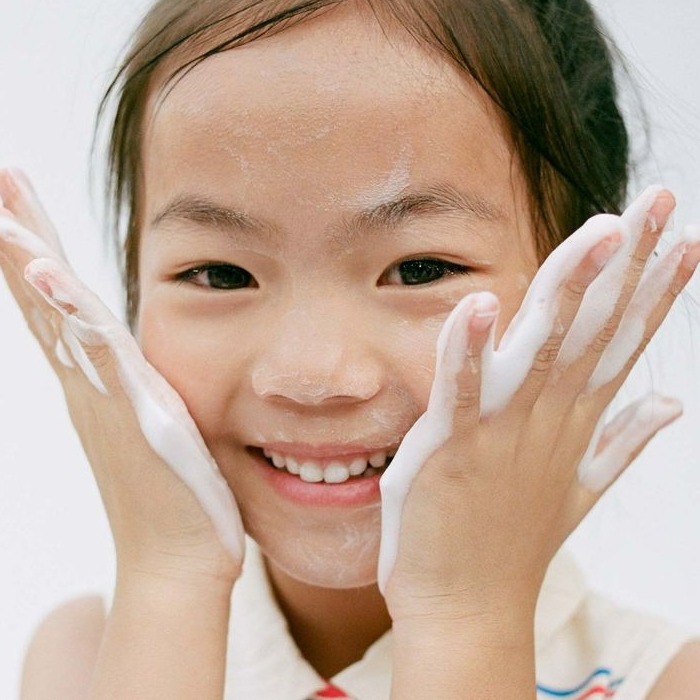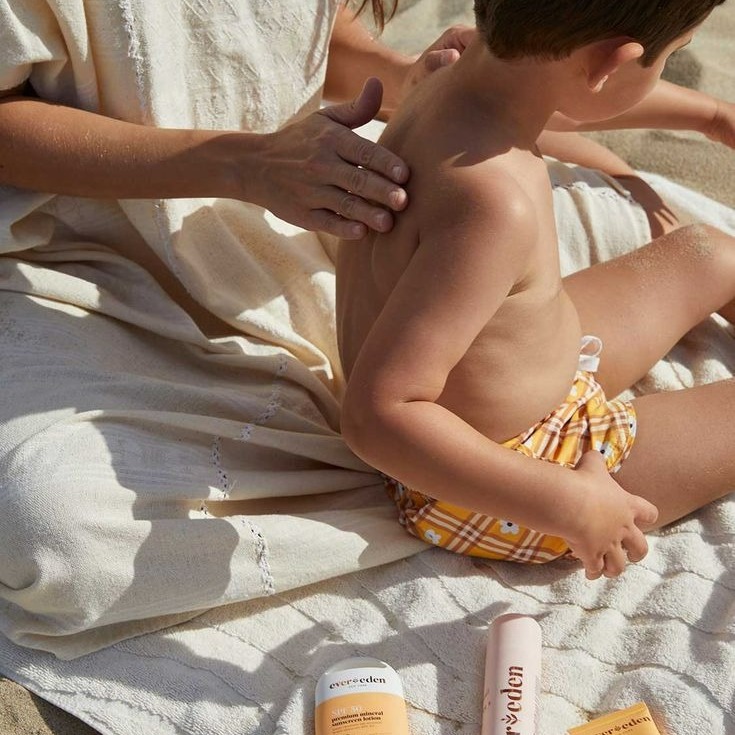The Importance of Skin Care for Children
Caring for a child’s skin is key for their overall well-being. A child’s skin is delicate. It needs gentle care from an early age. Good skin care can prevent issues such as rashes and infections. It also lays the foundation for healthy habits.
Children are exposed to different environments daily. This can include dirt, pollutants, and harsh weather. Proper skin care can protect their sensitive skin from these elements. It also helps maintain the natural barrier of their skin. This is vital in keeping their skin moisturized.
Moreover, teaching kids about skin care is educational. It builds their awareness about personal hygiene. It also gives them a sense of responsibility. By understanding their skin, children learn to make healthier choices.
Finally, skin problems can affect a child’s self-esteem. This is why promoting skin health is important. It can lead to confidence as they grow. Healthy skin care routines support their development into adulthood. So, taking care of children’s skin is not just about appearance. It’s about their health and confidence too.

Daily Skin Care Essentials for Every Child
Creating a daily skin care routine is important for every child’s skin health. The essentials of a kid’s skin care routine help guard against environmental factors and support overall well-being. Here are daily skin care essentials that are suitable for children:
Gentle Cleansing
Begin with a gentle cleanser in the morning and before bedtime. Use products formulated for kids, free from harsh chemicals. This removes dirt without stripping their delicate skin of natural oils.
Moisturizing
After cleansing, apply a mild, hypoallergenic moisturizer. This helps keep your child’s skin hydrated throughout the day. Choose one that suits their skin type, especially if they have dry or sensitive skin.
Sunscreen Application
Before your child heads outdoors, apply a broad-spectrum sunscreen. Even on cloudy days, UV rays can be harmful. Make sure the sunscreen is at least SPF 30 and reapply it every two hours.
Soft Fabrics
Dress your child in soft, breathable fabrics to prevent skin irritation. Cotton is an excellent option as it reduces the potential for itching and discomfort.
Hydration
Encourage your child to drink plenty of water. Hydrated skin is healthy skin, and it’s important to maintain moisture levels from the inside out.
Remember to repeat these steps daily. Consistency is key in maintaining healthy skin for kids. By following these essentials, you can help protect your child’s skin and teach them the importance of skin care from an early age.
Choosing the Right Skin Care Products for Kids
Selecting the right skin care products is crucial for your child’s skin health. Parents should look for products specifically designed for kids. Here are some tips to keep in mind:
Read Labels Carefully
Always check the labels for harsh chemicals or allergens. Opt for products with natural ingredients and without added fragrances.
Look for Hypoallergenic Products
Choose products that are hypoallergenic. These are less likely to cause an allergic reaction on sensitive skin.
Avoid Adult Products
Adult skin care items are too harsh for kids. Stick to formulas made for children’s delicate skin.
Patch Test New Products
Before using a product widely, do a patch test. Apply a small amount on your child’s arm and wait for any reactions.
Seek Products with Simple Ingredients
Simpler products are better for kids. They have fewer ingredients that can irritate the skin.
Consult a Pediatric Dermatologist
If in doubt, ask a pediatric dermatologist. They can recommend safe products for your child’s specific skin needs.
By following these guidelines, you can ensure the skin care items you choose are gentle yet effective for children’s skin. This will help maintain the health and integrity of your child’s skin barrier, while reducing the risk of skin problems.

Sun Protection for Children’s Skin
Sun protection is a vital part of kids skin care. Children’s skin is more sensitive to UV rays than adult skin. Sunburn can happen quickly, especially in the summer or at high altitudes. To shield your child’s skin from the sun, follow these simple steps:
Choose the Right Sunscreen
Pick a sunscreen that’s designed for children’s sensitive skin. It should be broad-spectrum and at least SPF 30. Make sure it’s water-resistant if your child will be swimming or sweating.
Apply Sunscreen Generously
Use enough sunscreen to cover all exposed skin. Don’t forget areas like the ears, back of the neck, and the tops of feet. Reapply every two hours and after swimming or sweating.
Wear Protective Clothing
Dress your child in long-sleeved shirts and long pants when possible. Clothes with a tight weave offer better protection from the sun’s rays.
Use Hats and Sunglasses
A wide-brimmed hat can protect your child’s face, ears, and neck. Sunglasses with UV protection help shield their eyes from harmful rays.
Seek Shade
Encourage playing in the shade during peak sun hours. This is typically between 10 am and 4 pm. Trees, umbrellas, and tents offer good protection.
Be Cautious Even on Cloudy Days
Clouds don’t block all UV rays. Use sunscreen and wear protective clothing even on overcast days.
By taking these steps, you can help ensure your child’s skin stays healthy and protected from the sun. Remember, skin care for kids includes sun safety every day, not just during the summer.
Managing Common Skin Problems in Kids
Children often encounter skin issues such as eczema, diaper rash, and dry skin. Being proactive can help manage and prevent these common problems. Here are some strategies:
Identify and Treat Eczema Early
Eczema is a common issue that causes dry, itchy skin. Look for red, inflamed patches. Keep the affected area moisturized. Use gentle, fragrance-free products. If eczema persists, see a doctor.
Prevent and Soothe Diaper Rash
Change diapers often to prevent rash. Clean the diaper area with mild wipes or water. Apply barrier creams to protect the skin. If diaper rash continues, talk to a pediatrician.
Tackle Dry Skin with Proper Hydration
Dry skin can be uncomfortable for kids. Use gentle moisturizers after baths. Choose hydrating products made for kids skin care. Encourage drinking water to hydrate from within.
Address Itching and Scratching
Itching leads to scratching, which can damage skin. Trim your child’s nails short. Teach them not to scratch. Offer soothing lotions or cool compresses instead.
Keep Infections at Bay
Cuts and scrapes can lead to infections. Clean wounds well and use antibiotic ointments if needed. Watch for signs of infection, like redness or pus, and consult a doctor.
By following these tips, you can help manage common skin problems in children. Remember to choose products suitable for kids skin care and be consistent with routines. If problems persist, seeking professional advice may be necessary.

Tips for Developing a Skin Care Routine for Kids
Establishing a skin care routine for your child can foster good habits and promote healthy skin. Here are some tips to keep in mind for developing an effective skin care routine for your little ones:
Start with the Basics
Teach your child the fundamentals: cleansing, moisturizing, and applying sunscreen. Keep the routine simple and fun to encourage regular practice.
Consistency is Key
Skin care routines are more effective when done regularly. Aim for a morning and evening routine every day to embed these good habits into your child’s lifestyle.
Educate on the Why
Help your child understand why skin care is important. Explain how each step protects and maintains their skin’s health.
Make It a Bonding Activity
Involve your child in purchasing products and performing their routine. This can strengthen your bond and make skin care enjoyable for them.
Lead by Example
Children learn by imitation. Practice your skin care routine alongside them to show its importance.
Customize the Routine
Consider your child’s skin type and any specific concerns. Tailor their routine to meet these needs, making it more effective.
Use the Right Products
Select kid-friendly products that are designed for young, sensitive skin. Look for items that are hypoallergenic and gentle.
Keep a Check on Progress
Observe your child’s skin for any changes or improvement. Adjust the routine and products as necessary.
Encourage Independence
As your child grows, encourage them to take charge of their skin care routine. Guide them but allow them to make decisions too.
By following these simple tips, you can help your child develop a skin care routine that’s both enjoyable and beneficial for their skin’s health.
The Role of Diet and Hydration in Children’s Skin Health
Good skin health goes beyond the products we apply. What children eat and drink has a huge impact. A balanced diet can boost their skin’s natural defenses. Hydration keeps the skin supple and strong. Here are some diet and hydration tips for kids skin care:
Incorporate Skin-Friendly Foods
Foods rich in vitamins and nutrients support skin health. Include fruits, vegetables, and lean proteins in your child’s diet. These provide the vitamins needed for healthy skin.
Omega-3 Fatty Acids Are Key
Omega-3s, found in fish and nuts, can reduce skin inflammation. They help manage conditions like eczema. Adding omega-3 fatty acids to meals can improve skin health.
Keep Sugary Foods to a Minimum
Sugary snacks can trigger skin issues. Aim to limit candies and sugary drinks. Instead, opt for natural sugars from fruits as snacks.
Hydration is Crucial
Encourage your child to drink water regularly. Hydrated skin is less prone to dryness and irritation. Make water easily accessible to them throughout the day.
Avoid Processed Foods
Processed items can harm skin health. They often contain additives that can trigger skin problems. Stick to whole, unprocessed foods for better skin.
By focusing on a diet rich in nutrients and proper hydration, you can help your child maintain healthy skin. Teach them to make good food choices for their overall well-being.
When to Consult a Dermatologist for Your Child’s Skin
For parents, knowing when to seek a dermatologist’s advice can be crucial for their child’s skin health. Here are situations where professional help is beneficial:
Persistent Skin Issues
If your child’s skin problems last despite home care, see a dermatologist. Persistent issues like eczema or acne need expert treatment.
Severe Symptoms
Any severe symptoms, such as intense itching or pain, require immediate attention. A dermatologist can provide relief and prevent complications.
Unusual Moles or Birthmarks
Check any odd moles or birthmarks with a dermatologist. They can screen for skin conditions and recommend care or monitoring.
Questions about Skin Care Products
If you’re unsure about skin care products for your child, get a dermatologist’s opinion. They can suggest suitable options for kids skin care.
Concerns about Skin Reactions
Allergic reactions or sensitivities need a specialist’s insight. Dermatologists can identify triggers and offer solutions.
Before Starting Treatment
For any skin treatment plan, especially involving medications, consult a dermatologist. They ensure it’s safe and appropriate for your child’s skin.
Family History of Skin Problems
If there’s a history of skin issues in the family, talk to a dermatologist. They can advise on preventive measures for your child.
By paying attention to these signs, parents can protect their child’s skin health. Remember, a dermatologist is a partner in maintaining your child’s skin and preventing future problems.